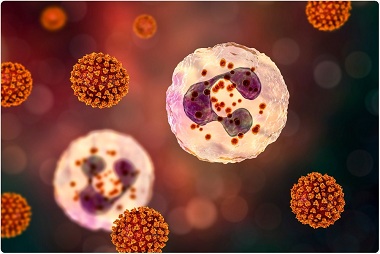University Of Helsinki Study Reveals That Low-Density Granulocytes (LDG) Plays A Role In COVID-19 Disease Outcomes
Source: COVID-19 Immunology Aug 31, 2021 3 years, 7 months, 3 weeks, 5 days, 11 hours, 45 minutes ago
A new study by researchers from the University of Helsinki-Finland has discovered the important role that Low-density granulocytes (LDG) play in the role of COVID-19 disease outcomes.

Typically severe COVID-19 is characterized by extensive pulmonary complications, to which host immune responses are believed to play a role. As the major arm of innate immunity, neutrophils are one of the first cells recruited to the site of infection where their excessive activation can contribute to lung pathology.
Low-density granulocytes (LDGs) are circulating neutrophils, whose numbers increase in some autoimmune diseases and cancer, but are poorly characterized in acute viral infections.
In the laboratory, these neutrophilic granulocytes remain in the fraction of peripheral blood mononuclear cells (PBMC) after density gradient separation.
Utilizing flow cytometry, the study team detected a significant increase of LDGs in the blood of acute COVID-19 patients, compared to healthy controls. Based on their surface marker expression, COVID-19-related LDGs exhibit four different populations, which display distinctive stages of granulocytic development and most likely reflect emergency myelopoiesis.
Importantly, COVID-19 LDGs show a link with an elevated recruitment and activation of neutrophils. Functional assays demonstrated the immunosuppressive capacities of these cells, which might contribute to impaired lymphocyte responses during acute disease.
The study findings confirm a significant granulocyte activation during COVID-19 and suggest that granulocytes of lower density play a role in disease progression.
The study findings were published in the peer reviewed journal: PLOS Pathogens.
https://journals.plos.org/plospathogens/article?id=10.1371/journal.ppat.1009721
Proper understanding of granulocytes assists researchers to understand mechanisms associated with COVID-19 and other infectious diseases. Such information also promotes the development of better diagnostic methods and therapies.
Normally most of the white blood cells in humans are neutrophils, which have received a lot of attention during the coronavirus pandemic due to their numbers growing in conjunction with COVID-19. However, their role in the disease remains partially unknown.
LDGs or Low-density granulocytes are a type of neutrophils whose number has been observed to grow particularly in connection with certain autoimmune diseases and cancers, such as rheumatoid arthritis, melanoma, liver cancer and breast cancer. Increased levels of these granulocytes have also been associated with septicaemia, but their general role and functioning in infectious diseases are yet to be comprehensively described.
The sudden debut of the SARS-CoV-2 coronavirus and the ensuing pandemic has demonstrated a need to investigate mechanisms of acute respiratory infections in more detail.
The research team from the University of Helsinki studied LDG levels in patients suffering from acute covid-19. The goal was to determine the role, if any, of LDGs in the disease.
In all, a total of 34 hospitalized patients
and 21 outpatients with mild symptoms were included in the study.
The study team used flow cytometry to measure LDG levels, detecting a significant increase in LDGs in the blood of acute covid-19 patients compared to healthy control subjects.
Luz Cabrera, a doctoral student at University of Helsinki, told Thailand Medical News, “These LDGs are cells associated with the innate immune response, and they fight acute infections. However, their effect on the progression of covid-19 appears to take place through an inhibiting effect on the proliferation and division of T lymphocytes, consequently potentially suppressing part of the adaptive immune response against the virus."
The study team identified several sub-types of LDGs in the acute COVID-19 patients, with four different LDG populations displaying distinctive stages of development.
According to the study team, the stages most likely reflect emergency myelopoiesis, that is, the production of granulocytes in the bone marrow.
The study team linked the elevated LDG levels to an increased neutrophil demand and, consequently, their activation in the circulation. This matches an inflammatory process where neutrophil progenitors, or immature neutrophils, are produced at a rapid rate.
The study team considers the immunosuppressive capacity of neutrophils demonstrated in the study a significant find, observed when they were isolating LDGs from the patients. When isolated in the laboratory, the cells began to secrete substances which inhibit T lymphocytes from dividing.
Corresponding author Luz Cabrera added, "Low T lymphocyte levels are one of the major severity indicators for covid-19. A more effective immune response can be the difference between a milder disease and more severe one."
For more on
Low-Density Granulocytes (LDG) and COVID-19, keep on logging to Thailand Medical News.
